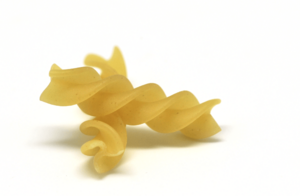Fusilli facts for kids

Fusilli
|
|
| Alternative names | Rotini |
|---|---|
| Type | Pasta |
| Place of origin | Italy |
Fusilli are a fun type of pasta shaped like tiny corkscrews or spirals. You might also know them as rotini. These twisty shapes are great for holding onto sauces!
Just like other pastas, fusilli come in different kinds. You can find plain ones or those made from whole wheat. But wait, there's more! Fusilli can also be colorful. Chefs mix different ingredients into the dough to change their color and even their taste. For example, beetroot or tomato can make them red. Spinach gives them a green color, and cuttlefish ink makes them black!
What's in a Name? The Story of Fusilli
The name fusilli comes from an old Italian word, fuso. This word means "spindle." Think of a spindle as a tool used for spinning thread. Long ago, people made fusilli by hand. They would press and roll a small rod over thin strips of pasta dough. This action would wind the dough around the rod, creating that famous corkscrew shape. It was almost like spinning the pasta!
Different Kinds of Fusilli Pasta
Fusilli pasta comes in a few different styles. Some fusilli are solid, meaning they are a complete spiral. Others are hollow, like tiny twisted tubes. These hollow ones are called fusilli bucati.
There are also very long, twisted versions. Imagine spaghetti coiled around something; these are known as fusilli lunghi. Another type, Fusilli Napoletani, are flat pieces of pasta that are coiled around a spindle.
You might hear the word rotini used a lot, especially in the United States. While rotini is similar, it's usually made differently. Instead of being coiled by hand, rotini is often pushed through a special machine that twists it into shape. Even though they are made differently, the words rotini and fusilli are often used to mean the same thing.
See also
 In Spanish: Fusilli para niños
In Spanish: Fusilli para niños
 | May Edward Chinn |
 | Rebecca Cole |
 | Alexa Canady |
 | Dorothy Lavinia Brown |

